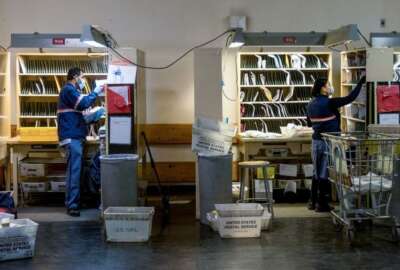

The Postal Service handed out millions of dollars in employee awards in a program that lacked solid controls. People nominated one another and then voted on whether...
Best listening experience is on Chrome, Firefox or Safari. Subscribe to Federal Drive’s daily audio interviews on Apple Podcasts or PodcastOne.
The Postal Service handed out millions of dollars in employee awards in a program that lacked solid controls. People nominated one another and then voted on whether they got the money. A few people even approved their own bonuses. For more, the Federal Drive with Tom Temin spoke with the deputy assistant inspector general for audit, Wilvia Espinoza.
Interview transcript:
Tom Temin: Tell us about the program you were looking at, this awards and recognition program for postal employees give us the scope of it. And you know how many people are involved in the kind of dollars involved every year.
Wilvia Espinoza: So for background purposes, the recognition and awards program is intended to recognize employees who have demonstrated outstanding performance, superior competence and have other significant contributions. So with the exception of three high level awards that were processed manually, basically all the awards that are over $100, whether they’re non-tangible or cash are processed through the E-Awards system, Postal Service’s award system. So what we did was we reviewed recognition and awards data from October 2017 through September 2021. And during this time frame, the Postal Service presented over 133,000 awards, totaling over 76.8 million. And these awards range from a letter of recognition to about $12,500 in cash.
Tom Temin: Oh, yeah, so someone can get real money. And this is available to everyone from letter carriers to people in management? Got it. And so what did you find with respect to management of the program? It sounds like not everybody that got an award was deserving.
Wilvia Espinoza: We found that overall postal service management could improve controls to effectively manage its recognition and awards program. Specifically, we had three points overall relating to the program that we wanted to highlight. First off, postal service management did not always exercise segregation of duties when submitting and approving awards. So for reference, the award system allows employees at various levels to both submit and approve awards. So we found we wanted to highlight that especially the numbers in the amount of awards have been increasing over the last four years, it’s essentially doubled. So from an internal controls perspective, we felt it was very judicious in us to highlight.
Tom Temin: It sounds like the potential for someone to say, well, I’ll give you an award if you give me one was kind of rampant here?
Wilvia Espinoza: Yes, that actually leads to our next topic that we found that employees were giving reciprocating awards to each other. So while it was not as rampant, we felt it was an additional control we needed to highlight as well. Second, we also found that management approved about 69% of the 53,000 award justifications we reviewed, despite them being inadequate, and having insufficient justification for purposes of that award.
Tom Temin: So that’s about what 60% of them are so almost, I could call it a rubber stamp, you probably would not call it that. But it sounds like maybe out of band for what you would expect.
Wilvia Espinoza: Right.
Tom Temin: And this idea of people giving awards to one another. How is that possible? I mean, maybe tell us more about the system. That is to say, where you submit these things electronically? That sounds like there are not enough rules built into that system to prevent things from moving up the ranks to be judged.
Wilvia Espinoza: Yes. And that was something that we definitely wanted to highlight. As part of this report, we actually did find six individuals who were able to submit and approve awards for themselves, which Postal Service did take corrective actions. They did take immediate actions with regard to that specific control. However, we still had a large amount of people submitting and approving awards for other people in the system as well.
Tom Temin: You had 254 employees submitted 598 reciprocating awards for one another. And it was close to a million dollars.
Wilvia Espinoza: Yes. Although in the grand scheme of things, from an overall perspective, it’s a little bit minor. But we did want to highlight it as a control related issue in that system, unfortunately, doesn’t have the controls in place to not allow that.
Tom Temin: Right. In other words, it shouldn’t even have gotten to the point of where someone could pass judgment on it. It should not have been submitted in gone through the system in the first place.
Wilvia Espinoza: Yes, I do want to clarify, though, that we did rely on the information entered into the award system to perform our audit. We did not review each award and make a determination as to whether or not it should not have been awarded. So we specifically wanted to highlight potential system and internal controls issues as it relates to the overall award system. So the perception alone of Postal Service improperly awarding employees could lead to larger scale issues like employee morale and retention, which is very important in this environment.
Tom Temin: And if you add it all up, what do you suspect or what do you estimate was the value of the awards that were undeserved that went out?
Wilvia Espinoza: So as a part of this audit, we questioned around $32.8 million in question costs over the four year period.
Tom Temin: Yeah, so that’s real money.
Wilvia Espinoza: Correct.
Tom Temin: And how does the Postal Service react when presented with this information?
Wilvia Espinoza: It was a mixed bag. They acknowledged and agreed to take corrective action to two of the four recommendations. However, the largest one at least in from our stance, with regard to segregation of duties they did not agree to. So we do intend on following up with them through the our formal audit resolution process to see what postal service can do to help with this issue.
Tom Temin: Yeah, tell us more about that issue. What is it they specifically don’t want to do that you recommended?
Wilvia Espinoza: So from Postal Service stance, they believe that there can be certain individuals that are given the authority to both submit and approve awards, and they believe that that is OK, as a part of their own function and mission. From our perspective, though, it kind of does not tie into the importance of segregation of duties, internal controls, and it could lead to appearance issues, or even fraudulent issues as well.
Tom Temin: Or favoritism.
Wilvia Espinoza: Right.
Tom Temin: So in other words, your view is that the person submitting should not be the person ever deciding.
Wilvia Espinoza: Yes, agree. And that’s fundamental to any critical business function, any financial transaction, there should be at least two people involved. One person submitting and another approving.
Tom Temin: Yeah, because I think even in a standard management situation, if you want to give an employee a bonus, outside of formal awards program, you would still need your boss to make sure it’s OK. I’ve never seen a situation where someone can arbitrarily grant it without third party, the controller, or the supervisor of the supervisor having a say in other words.
Wilvia Espinoza: And another thing that we did was we conducted a survey to obtain management’s impressions of and satisfaction of the recognition and awards program. And we found that the survey identified that 53% of respondents disagreed or strongly disagreed, that guidance for an award is clear and easy to follow. So that we felt provided additional insight as to what the Postal Service could do to improve from that to improve the program overal.
Tom Temin: Right. So the people involved at the lower levels feel the whole thing is kind of foggy. And since 21, which is the final zone of when you had data for, have they made some changes in the meantime?
Wilvia Espinoza: The only corrective action that they did make was the immediate one as we were performing the audit was the one issue that we identified where individuals submitted and approved awards for themselves.
Tom Temin: Wilvia Espinoza is deputy assistant inspector general for audit at the U.S. Postal Service.
Copyright © 2025 Federal News Network. All rights reserved. This website is not intended for users located within the European Economic Area.
Tom Temin is host of the Federal Drive and has been providing insight on federal technology and management issues for more than 30 years.
Follow @tteminWFED


